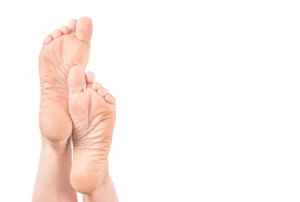Introduction
Our feet are remarkable structures that support us through every step of our lives. However, they are also subject to various skin conditions that can cause discomfort and affect our overall well-being. Understanding these common foot skin conditions is crucial for maintaining healthy feet and seeking appropriate treatment. This blog post will explore some of the most prevalent foot skin conditions, their causes, symptoms, and treatment options.
Athlete’s Foot: A Common Foot Skin Condition
One of the most well-known foot skin conditions is Athlete’s Foot. This fungal infection, scientifically known as tinea pedis, thrives in warm, moist environments, making the feet a perfect breeding ground. Athlete’s Foot commonly presents symptoms such as itching, burning, redness, and peeling skin. It can cause blistering and cracking of the skin, causing pain and discomfort.
Topical and oral antifungal medications are often recommended to effectively treat athlete’s foot. Additionally, keeping feet clean and dry, wearing shoes that breathe, and avoiding walking barefoot in public places can prevent a recurrence.
Plantar Warts: Another Common Foot Skin Condition
Plantar warts are another prevalent foot skin condition caused by the human papillomavirus (HPV). Warts usually appear on the soles of the feet and can cause discomfort or pain, especially when walking or standing. Plantar warts often have a rough texture and may feature tiny black dots, which are small blood vessels.
Several treatment options for plantar warts include topical medications, cryotherapy (freezing), laser therapy, or surgical removal. However, seeking professional guidance for proper diagnosis and treatment is essential, as self-treatment methods can sometimes worsen the condition.
Corns and Calluses: Common Foot Skin Conditions Due to Friction
Calluses and corns are thickened areas of skin that develop from repeated friction or pressure, often caused by ill-fitting footwear or excessive rubbing. While corns typically develop on the toes, calluses are more commonly found on the soles of the feet. These foot skin conditions can be uncomfortable and may cause pain or tenderness.
Treatment for corns and calluses involves gently removing the thickened skin and addressing the underlying cause of friction. Wear proper shoes, padding, or orthotic inserts to redistribute pressure on the feet.
Blisters: Common Foot Skin Condition Caused by Friction or Irritation
Blisters are fluid-filled sacs on the skin’s surface due to friction, irritation, or excessive pressure. In most cases, they are found on areas subjected to rubbing from footwear, such as the heels or toes. Blisters can be painful and may increase the risk of infection if not properly cared for.
Treatment for blisters involves keeping the affected area clean and protected. If a blister has not ruptured, it’s best to leave it intact to prevent infection. However, if a blister does burst, it should be carefully cleaned with mild soap and water, and a sterile bandage should be applied to protect the exposed skin. Additionally, wearing properly fitting socks and shoes can help prevent blisters from forming in the first place.
Fungal Nail Infections: Foot Skin Conditions Affecting the Toenails
Fungal nail infections, also known as onychomycosis, are common foot skin conditions that affect the toenails. These infections are typically caused by the same fungi responsible for Athlete’s Foot and thrive in warm, moist environments. Thickened, discolored, or brittle nails are symptoms of fungal nail infections, such as nail separation from the nail bed.
Treatment for fungal nail infections may involve topical and oral antifungal medications, depending on the severity of the infection. In some cases, laser therapy or surgical nail removal may be recommended. It’s important to seek professional treatment for fungal nail infections, as they can worsen over time and may spread to other nails or even the skin.
Eczema and Psoriasis: Chronic Foot Skin Conditions
Eczema and psoriasis are chronic skin conditions that affect various body parts, including the feet. Eczema, also known as atopic dermatitis, is characterized by red, itchy, and inflamed skin. At the same time, psoriasis presents as thick, scaly patches of skin that may be silver or white. Both conditions can cause discomfort and may flare up due to triggers such as stress, certain foods, or environmental factors.
Treatment for eczema and psoriasis typically involves a combination of topical medications, moisturizers, and lifestyle modifications to manage symptoms and reduce flare-ups. Phototherapy or oral medications may sometimes be prescribed to help control symptoms. Individuals with eczema or psoriasis must work closely with a dermatologist or healthcare provider to develop an effective treatment plan tailored to their needs.
Diabetic Foot Complications: Serious Foot Skin Conditions
For individuals with diabetes, foot skin conditions can pose a significant risk to foot health and overall well-being. Diabetes can cause nerve damage (neuropathy) that reduces blood flow to the feet, increasing the chances of developing foot ulcers, infections, and other complications. Individuals with diabetes need to pay close attention to foot care and seek prompt medical attention for any foot-related concerns.
Preventive measures for diabetic foot complications include maintaining proper blood sugar control, inspecting the feet daily for signs of injury or infection, wearing properly fitting footwear, and avoiding walking barefoot. Regular foot exams by a healthcare professional, such as a podiatrist, are also crucial for early detection and management of foot-related issues in individuals with diabetes.
Conclusion
In conclusion, understanding common foot skin conditions such as Athlete’s Foot, plantar warts, corns, calluses, blisters, fungal nail infections, eczema, psoriasis, and diabetic foot complications is essential for optimal foot health. If you’re experiencing symptoms of any of these conditions, it’s crucial to seek professional care from a podiatrist, dermatologist, or healthcare provider.
At Integrity Foot And Ankle Associates, our team of experienced professionals is dedicated to providing comprehensive foot care services tailored to your individual needs, whether you’re dealing with a common foot skin condition or more serious foot-related issues.
Don’t let foot skin conditions interfere with your daily activities and overall well-being. Contact Integrity Foot And Ankle Associates today to schedule a consultation and take the first step toward healthier, happier feet. Your feet deserve the best care; we’re here to provide it.





